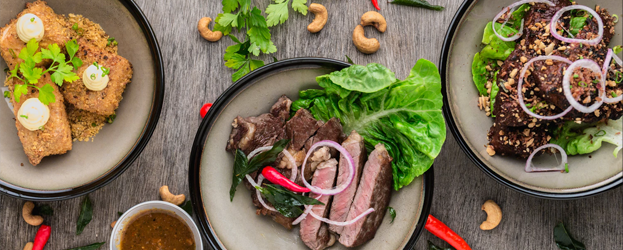What is Mindful Eating and why is it important after bariatric surgery?

Mindful eating refers to paying full attention to your eating habits and the full experience of eating and drinking. Practising mindful eating is not only important after bariatric surgery but becomes even more important as Christmas and new year festivities draw closer. By taking practising mindful eating habits during the holiday season, you’ll be able to maintain your weight loss and healthy habits instead of falling into the unhealthy trap of over-indulgence.
Why is mindful eating important after weight loss surgery?
In the first year after bariatric surgery, most patients lose a large percentage of their excess weight due to the drastic reduction in the amount of food they can eat and the nutrients they can absorb from their food. However, most bariatric patients struggle with emotional eating. This can be eating when you’re bored, sad, happy or frustrated.
This can and does lead to weight gain after the gastric sleeve, gastric bypass, and lap band.
Mindful eating after weight loss surgery is important because instead of focusing on emotional triggers, you listen to what your body is trying to tell you. Mindful eating also causes you to make the most of your new stomach and your meal.
Finally, by practising mindful eating, you’ll be able to maintain your overall health and well-being and gain a new appreciation for your food.

How do I eat mindfully after bariatric surgery?
It doesn’t matter if you’ve had the lap band, gastric sleeve, gastric bypass or SIPS procedure, it’s possible to eat mindfully. Here’s how to do it:
Know your body’s hunger signs
The next time you reach for food, ask yourself: ‘Am I responding to my body’s needs or an emotional want?” Most of us eat when we get emotional signals. This can range from happiness to sadness and boredom. Instead of eating when we feel these emotional triggers, mindful eating encourages you to listen to your body. How are you feeling? Are you really hungry? Is your stomach growling? Are you feeling a little light headed? Are your energy levels low?
By listening to your body’s hunger signs and questioning why you’re reaching for food, you’re practising mindful eating.

Understand your body and brain aren’t in sync when you eat
How quickly do you eat? Do you know that as a bariatric patient, you should take 30 minutes on average to eat your meal? Forget scoffing down a sandwich within three minutes, it’s recommended that you spend a minimum of 10 minutes eating.
Why is this recommended? Eating slowly has its benefits after bariatric surgery. It stops you fromfilling up your new stomach too quickly and risking dumping syndrome. However, eating slowly helps to tighten the gap between your body and brain communicating when you feel full.
When you eat, your body feels full nearly 20 minutes after your brain registered you were full. This is why you may unconsciously over-eat. Eating slowly is one of the best ways to get your brain and body to communicate your nutritional needs. By slowing down when you eat, you give your body a chance to catch up to your brain and hear the signals. Do this by chewing slowly and thoroughly when you eat, placing down your eating utensils between bites, savouring every bite of your meal and making note of your food’s flavour and texture.
Even better, it makes your food more enjoyable!
Don’t eat while you’re distracted
We all live busy lifestyles and our lives are full of distractions. It can be the tv, our phone, social media…our minds are being constantly stimulated by the world around us.
When you eat, eliminate the distractions around you by turning off the tv and putting your phone away.
Stop eating when you feel full
One more bite won’t hurt.
Taking that extra bite (or bites) can link to discomfort and symptoms of dumping syndrome such as vomiting, light headedness, cramps and abdominal pain.
Drop your eating utensils when you start to feel full. One more bite can hurt.

How can I practise mindful eating this Christmas?
- Eat your meal slowly, even though everyone around you is eating their Christmas meal at a hundred miles an hour
- Listen to your physical hunger cues. Don’t feel pressured to eat because there’s lots of food available at the Christmas table and party, and don’t eat because you’re feeling very festive or upset
- Engage your senses when eating by noticing your food’s colour, its smell, texture and taste
- Understand and learn how to cope with your guilt and anxiety about food (you can read our survival guide on surviving eating at Christmas after bariatric surgery here)
- Eat to maintain your overall health and well-being. Remember, your nutrient intake is vital to your success and overall health after weight loss surgery
Here’s to a happy Christmas and a wonderful new year. How are you going to practise mindful eating this holiday season?



